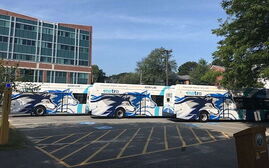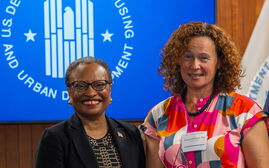On the Record: John T. Gorman Foundation aims to help Maine children in need
 Photo / Jim Neuger
Nicole Witherbee is president and CEO of the Portland-based John T. Gorman Foundation, which provides support services for Maine children and families in need.
Photo / Jim Neuger
Nicole Witherbee is president and CEO of the Portland-based John T. Gorman Foundation, which provides support services for Maine children and families in need.
Nicole Witherbee is president and CEO of the Portland-based John T. Gorman Foundation, which provides support services for Maine children and families in need. The organization employs a staff of nine and has a 2023 budget of around $11.6 million.
Mainebiz: What triggered your early career path as a community organizer?
Nicole Witherbee: I became a single mother while still in college, taking a full course load and working full-time. It didn’t take long to realize that raising a child couldn’t be done alone. I was surrounded by a lot of great people, but not everyone has that kind of support. Being an organizer allowed me to work at creating the kind of community that could support more people when they needed it.
MB: What did you do after that?
NW: To make a difference on a greater scale, I shifted my work to concentrate on addressing policy change at the state and federal level. Eventually, I got my Ph.D. and moved with my husband and three children to Maine, where I continued to work at the policy level before starting a consulting firm, where we provided research, evaluation and program design to non-profits, governments and occasionally the private sector. When I was invited to come work for the John T. Gorman Foundation, I recognized the ability to be more flexible and creative in addressing the needs of families, and that was too good to pass up.
MB: What motivates you as a nonprofit leader?
NW: Knowing that there are people desperately trying to find ways to support their children, and that if we do our jobs well, we can help.
MB: Who was John (Tom) Gorman and how did the foundation come to be?
NW: Tom Gorman, a grandson of Leon Leonwood Bean, started the foundation in 1995 as a way of giving back to the community. Tom was generous and empathetic to the plight of people who found themselves on the margins and wanted to do his best to alleviate their suffering. He died in 2010, leaving his estate to the foundation so that his resources could help more people.
MB: What is the foundation’s mission?
NW: The foundation is focused on helping Maine children — particularly those experiencing poverty — be resilient and ready to succeed. We do that by testing new ways to ensure children and families have the tools to be successful, and if effective, could be taken to greater scale through practice and policy change.
MB: Can you give concrete examples illustrating the foundation’s impact?
NW: In 2012, we learned that hundreds of children in Lewiston’s school system had lead poisoning. Over the course of 10 years, we made multiple investments in the city’s education, employment, child care and legal systems and created loan funds for the redevelopment of distressed properties. We supported the city’s capacity to apply for lead hazard reduction funds and $30 million in federal redevelopment funding. Today’s rate of childhood lead poisoning is less than half of what it was 10 years ago, and families have access to more resources.
MB: How do you join with Maine employers and others on workforce development?
NW: The investments we make in workforce development are centered on helping parents/caretakers who are experiencing poverty access jobs that will allow for skill-building and mobility. That often means working with employers and parents to understand the supports and skills needed to be successful, such as child care, transportation or credentialing needs.
MB: What do you see as Maine’s biggest economic challenge today and why?
NW: Given Maine’s aging demographic, we need every child to grow up prepared to participate in the workforce and lead our state forward. Unfortunately, too many children are going hungry, experiencing homelessness, and enduring the stress of chronic poverty. Addressing this is both a moral and economic imperative. If we don’t do better by Maine kids, they won’t be prepared when we need them to be.
MB: And its biggest challenge overall?
NW: Doing better by Maine’s children is our biggest challenge, economically or otherwise.













0 Comments